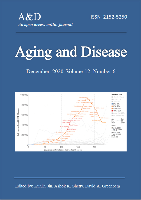
CELL
Scope & Guideline
Elevating understanding through high-impact research.
Introduction
Aims and Scopes
- Cellular Aging Mechanisms:
Research on the biological processes that contribute to aging at the cellular level, including cellular senescence, epigenetic changes, and oxidative stress. - Neurodegenerative Diseases:
Investigation into the cellular and molecular mechanisms underlying neurodegenerative diseases such as Alzheimer's and Parkinson's, focusing on tau pathology, amyloid-beta dynamics, and neuroinflammation. - Metabolism and Aging:
Studies examining how metabolic pathways and interventions, such as caloric restriction and pharmacological agents, influence aging processes and health outcomes. - Stem Cell Biology:
Exploration of stem cell behavior in aging, including their differentiation potential, regenerative capacity, and response to environmental cues. - Microbiome and Aging:
Research on the interplay between the gut microbiome and aging, investigating how microbial communities affect metabolic health and age-related diseases. - Therapeutic Interventions:
Development and evaluation of therapeutic strategies, including senolytics and dietary interventions, aimed at mitigating the effects of aging and enhancing healthspan. - Systems Biology Approaches:
Utilization of multi-omics strategies to understand the complex interactions governing cellular aging and disease.
Trending and Emerging
- Epigenetic Modifications and Aging:
A growing body of research is focusing on how epigenetic changes influence aging processes, including DNA methylation and histone modifications, as potential biomarkers and therapeutic targets. - Inflammaging and Immune Senescence:
Increasing attention is being paid to the role of chronic inflammation in aging and how immune system alterations contribute to age-related diseases, emphasizing the need for immunomodulatory therapies. - Microbiome Influence on Aging:
Emerging studies are exploring the role of the gut microbiome in modulating aging and healthspan, highlighting the potential for microbiome-targeted interventions. - Technological Advances in Aging Research:
The integration of advanced technologies such as single-cell sequencing and multi-omics approaches is rapidly gaining traction, enabling more nuanced insights into aging mechanisms. - Personalized Medicine and Aging:
There is a trend towards developing personalized therapeutic strategies based on individual genetic and metabolic profiles, aiming to optimize interventions for age-related conditions. - Regenerative Medicine and Tissue Engineering:
Research focusing on harnessing the potential of stem cells and regenerative medicine to combat age-related degeneration is on the rise, with implications for tissue engineering and repair.
Declining or Waning
- Traditional Pharmacological Interventions:
There has been a noticeable decrease in studies focusing solely on traditional small-molecule pharmacological interventions, with a shift towards exploring holistic and multi-targeted therapeutic strategies. - Basic Cellular Mechanisms without Disease Context:
Research that purely investigates cellular mechanisms in isolation, without a clear connection to aging or disease relevance, is becoming less frequent as the journal emphasizes translational and applied research. - Animal Models with Limited Relevance to Human Aging:
Studies using outdated or less relevant animal models for aging research are declining as the field moves towards models that better mimic human aging processes. - Single-Factor Studies:
There is a waning interest in research that examines the effects of single factors on aging, as the complexity of aging necessitates a more integrative approach.
Similar Journals

Cell Stress
Pioneering Insights into Cellular ResilienceCell Stress is a prestigious, peer-reviewed open access journal dedicated to advancing research in the fields of biochemistry, genetics, molecular biology, cancer research, and physiology. Published by SHARED SCIENCE PUBLISHERS OG in Austria, this journal has rapidly established itself since its inception in 2017, achieving Q1 status in multiple categories, indicative of its high impact and quality. With an impressive Scopus ranking—holding a top percentile position in its respective fields—Cell Stress aims to foster interdisciplinary collaboration and disseminate cutting-edge findings that enhance our understanding of cellular stress mechanisms and their implications in health and disease. The journal's commitment to open access since its launch ensures that critical research is accessible to a global audience, thereby facilitating the exchange of knowledge among researchers, professionals, and students alike. Address your submissions or inquiries to AM BLUMENHAG 25-4, Graz 8010, Austria, and contribute to this dynamic platform that is shaping the future of molecular medicine.

GeroScience
Bridging Disciplines in Age-Related ResearchGeroScience, published by Springer, is an esteemed open-access journal that focuses on the multidisciplinary field of aging research. Since its inception in 2017, the journal has quickly established itself as a leader in its field, achieving impressive Q1 quartile rankings across various categories, including Aging, Cardiology and Cardiovascular Medicine, Geriatrics and Gerontology, and Complementary and Alternative Medicine, as per 2023 evaluations. With a significant impact factor that underscores its influence and reach in academia, GeroScience aims to disseminate high-quality research that addresses the complex challenges and advancements related to aging. Its accessible publication format fosters greater dissemination of knowledge and encourages collaboration among researchers, practitioners, and students eager to contribute to the growing body of work on age-related health issues. As it continues to thrive, GeroScience remains a pivotal resource for anyone looking to stay at the forefront of aging research.

Aging and Disease
Fostering collaboration for a healthier aging population.Aging and Disease is a leading open-access journal published by the International Society on Aging and Disease, dedicated to advancing the understanding of aging and its associated diseases. Since its inception in 2010, the journal has established itself as a vital resource for researchers and practitioners in the fields of Geriatrics, Neurology, Cell Biology, and Pathology. With an impressive Q1 ranking across multiple categories and a robust position in Scopus rankings, including ranks in the top 3% in Geriatrics and Gerontology, it showcases high-quality research that addresses the complexities of aging processes. Each issue presents original articles, reviews, and insights aimed at improving health outcomes for the aging population. The open-access model ensures that valuable research findings are readily available to a global audience, fostering collaboration and innovation. As a go-to publication for scholars, healthcare professionals, and students, Aging and Disease significantly contributes to the multidisciplinary dialogue surrounding aging and its health implications.

ACTA HISTOCHEMICA
Elevating Histochemistry: Where Research Meets Real-World ImpactACTA HISTOCHEMICA, a prestigious journal published by Elsevier GmbH, is dedicated to advancing the field of histochemistry and its applications within cell biology and medicine. With an ISSN of 0065-1281 and an E-ISSN of 1618-0372, the journal provides a critical platform for the dissemination of high-quality research findings and reviews, integral for both emerging and established scholars. Since its inception in 1954 and continuing through to 2024, ACTA HISTOCHEMICA has maintained a strong commitment to publishing significant advancements in histology and cell biology, as evidenced by its categorization in Q3 for Cell Biology and Histology, as well as Q2 in miscellaneous medicine for the year 2023. The journal ranks favorably in Scopus, holding the 27th rank in Histology and a 200th rank in Cell Biology, highlighting its importance to the academic community. With its headquarters in Munich, Germany, ACTA HISTOCHEMICA continues to attract contributions from global researchers, fostering an international dialogue essential for the growth of knowledge in histochemistry and related disciplines.

Frontiers in Aging
Bridging Disciplines for a Healthier FutureFrontiers in Aging is a leading academic journal published by FRONTIERS MEDIA SA, dedicated to advancing the understanding of the biological processes associated with aging. Established in 2020, this open-access journal aims to bridge the gap between various disciplines including genetics, molecular biology, and physiology, providing a multidisciplinary platform for researchers and clinicians alike. With a notable impact factor denoted by its Q2 quartile rankings in Aging, Genetics, and Molecular Biology, and a Q1 ranking in Physiology as of 2023, the journal is recognized for its contribution to the scientific community. Located in Lausanne, Switzerland, it is committed to promoting open discourse and publishing cutting-edge studies that address the complexities of aging and its implications for health and longevity. The journal’s editorial board, consisting of leading experts, ensures the rigorous peer-review process, maintaining high academic standards and fostering innovation in aging research.

CELL CYCLE
Advancing the Frontiers of Cell Biology.CELL CYCLE, an esteemed journal published by Taylor & Francis Inc., stands at the forefront of biological research, focusing on the intricate mechanisms of cell proliferation, molecular biology, and developmental biology. With an ISSN of 1538-4101 and an E-ISSN of 1551-4005, this journal has established its influence in the field with a commendable impact factor reflecting its rigorous peer-review process and high-quality publications. Notably, in 2023, it achieved a Q1 ranking in Medicine (miscellaneous) and a Q2 ranking in both Cell Biology and Developmental Biology, marking its vital role in advancing scientific understanding and innovation. Operating within a converged framework from 2002 to 2024, CELL CYCLE caters to a diverse audience of researchers, professionals, and students eager to explore contemporary findings and emerging trends. The journal's objective is to disseminate groundbreaking research that enhances our understanding of cellular mechanisms, fostering collaboration and innovation. Although not an open-access journal, it remains a premier source for those engaged in cell cycle research, and its contributions have significant implications for fields such as healthcare, biotechnology, and genetics.

GERONTOLOGY
Transforming Understanding of Geriatric HealthGERONTOLOGY, published by KARGER in Switzerland, is a prominent journal dedicated to the study and understanding of aging, with a keen focus on the interdisciplinary aspects of geriatric medicine and gerontology. Established in 1957, it has provided a platform for cutting-edge research that covers a wide range of topics including, but not limited to, the biological, psychological, and sociological aspects of aging. With an impressive ranking that places it in the Q3 category for Aging and Q2 for Geriatrics and Gerontology as of 2023, the journal continues to attract high-quality submissions from researchers worldwide, evidenced by its Scopus rankings, which position it favorably within relevant fields. While it operates under a subscription model, the journal remains committed to advancing knowledge that informs practice and policy within an aging society. By fostering innovative studies and discussions, GERONTOLOGY serves as an essential resource for researchers, health professionals, and students alike, dedicated to the care and understanding of older adults.

Cell and Bioscience
Exploring the Intersection of Science and InnovationCell and Bioscience is a prestigious open-access journal published by BMC that has been at the forefront of biochemistry, genetics, and molecular biology since its inception in 2011. With an impressive impact factor, this journal has established itself as a vital resource for researchers and professionals in these rapidly advancing fields, reflecting its high ranking of #29 out of 221 in the Scopus classification and placing it in the 87th percentile. Based in the United Kingdom, Cell and Bioscience aims to foster innovation and dissemination of research findings addressing critical biological questions through rigorous peer-reviewed articles and inter-disciplinary approaches. The journal's open-access model ensures unrestricted access to transformative research, promoting collaboration and knowledge sharing among academics, students, and practitioners worldwide. With a commitment to maintaining excellence in the field, Cell and Bioscience provides an essential platform for those looking to contribute to the evolving landscape of biosciences.

BIOGERONTOLOGY
Innovating Insights into Aging and Geriatric HealthBIOGERONTOLOGY, published by SPRINGER, is a premier journal dedicated to the interdisciplinary study of biological aging processes and their implications for health and longevity. With an ISSN of 1389-5729 and an E-ISSN of 1573-6768, this journal features cutting-edge research that addresses critical questions in the fields of aging, geriatrics, and gerontology. Ranking impressively in the top quartiles, particularly as Q1 in Gerontology, BIOGERONTOLOGY is recognized for its contributions to advancing the understanding of aging at both molecular and systemic levels. The journal’s rich repository of scholarly articles provides valuable insights for researchers, healthcare professionals, and students alike, fostering a deeper comprehension of age-related biological mechanisms. Although not an open-access journal, it is highly regarded with an impact factor that reflects its significant role in the academic community. The journal spans from 2000 to 2024, ensuring a broad historical context for its studies, and is based in the Netherlands, with its administrative office located at One New York Plaza, Suite 4600, New York, NY 10004, United States. Engaging with BIOGERONTOLOGY means joining a global dialogue on the science of aging and the implications it holds for humanity.

AGING CELL
Exploring the Frontiers of Aging ResearchAGING CELL is a premier peer-reviewed journal published by Wiley, specializing in the rapidly evolving field of aging research and cell biology. Established in 2002 and enjoying an impressive track record as evidenced by its Q1 ranking in both Aging and Cell Biology categories for 2023, the journal has become a vital resource for researchers and professionals alike. With a significant impact factor highlighting its scholarly influence, AGING CELL offers an open access model since 2014, ensuring that groundbreaking research is accessible to the global community. The journal covers a wide array of topics related to the mechanisms of aging at the cellular and molecular levels, making it essential reading for anyone invested in understanding the complexities of aging processes and their implications for health and disease. With a broad international readership based in the United Kingdom and beyond, AGING CELL is dedicated to disseminating high-quality research that impacts scientific understanding and fosters advances in the field.